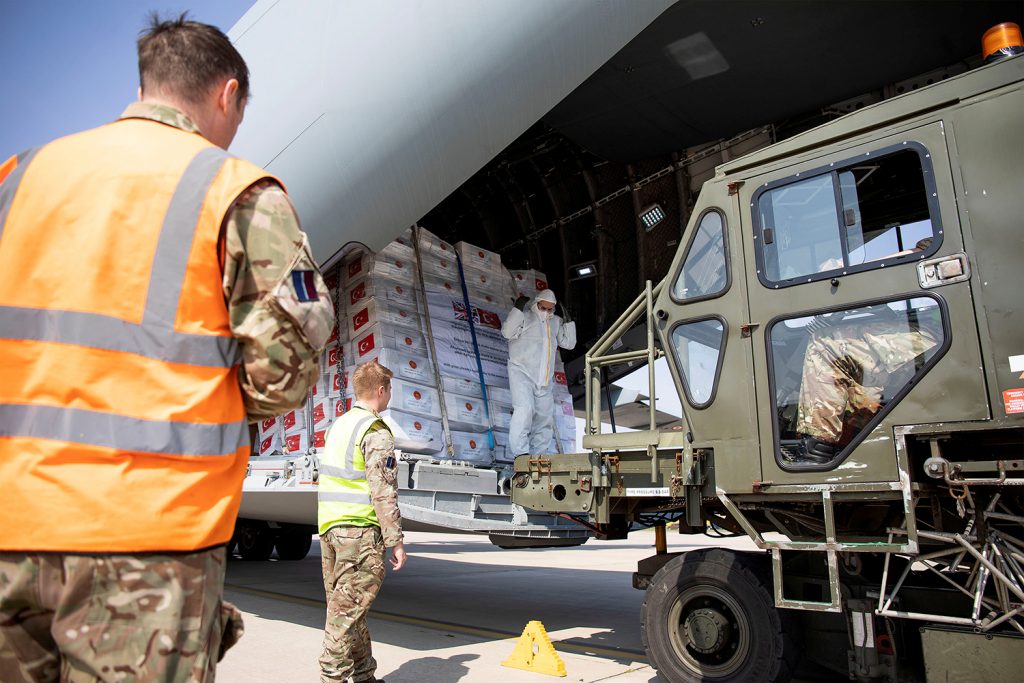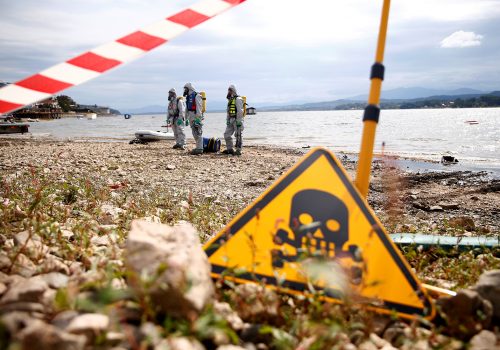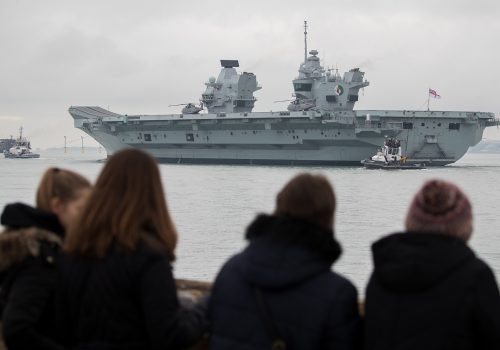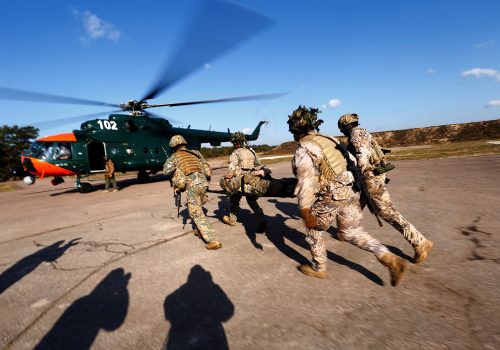As NATO defense ministers meet on April 15 for their second-ever virtual ministerial, the COVID-19 pandemic continues to take its toll on Europe and North America. Allies such as Italy, Spain, and the United States are especially hard hit—as of writing they together have over 900,000 confirmed cases and over 60,000 deaths.
The speed and intensity with which the virus has impacted Europe and North America has left healthcare systems struggling to keep up with the still growing number of cases, and shortages of crucial medical supplies are becoming more common. To provide relief, national militaries across Europe have been pulled into service—German Air Force aircraft are being used to airlift patients from crowded hospitals in France to facilities in Germany, US Army Europe has delivered supplies to Italy, and Italian soldiers are helping local law enforcement to enforce shelter-in-place guidelines. And in the UK, French staff assigned to NATO posts are even jumping in to reinforce the UK’s response.
As the pandemic has gone on, Allies have turned to NATO to help provide relief and needed aid to struggling healthcare sectors. “NATO is doing its part to help in this common fight against an invisible enemy” NATO Secretary General Jens Stoltenberg said. “We are in this crisis together and when we respond together, our response is more effective.”
To that end, NATO has several unique crisis management capabilities that help Allies coordinate requests and offers of assistance, contribute to the swift delivery of aid, control and fast-track needed aid, and communicate requirements for civil preparedness in the face of pandemics.
Euro-Atlantic Disaster Response Coordination Center
The Euro-Atlantic Disaster Response Coordination Centre (EADRCC) is NATO’s main civil emergency response organ and functions as a coordinating body for relief requests among Allies and with partner nations. Operating 24/7, it acts as a “clearing house,” collecting requests for support from Allies and partners, passing them to other Allies, and coordinating offers of relief. The Centre continues to track all activities and issues regular reports on ongoing efforts to ensure the level of requests are met.
The EADRCC has helped coordinate relief efforts to numerous natural and man-made disasters including flooding in Bosnia and Herzegovina, forest fires in Montenegro, Hurricane Harvey in the United States, and disposal of dangerous munitions in Ukraine. Since the beginning of the COVID-19 pandemic the EADRCC has received nine requests for international assistance from Allies and partners alike, helping coordinate the delivery of ventilators from Germany, personal protection equipment from Turkey, and respirators from the Czech Republic to Allies in need.
Contributing Rapid Airlift
Two recent initiatives to provide Allies with strategic airlift for military and civilian missions, the Strategic Airlift Interim Solution (SALIS) and Strategic Airlift Capability (SAC) see select groups of Allies and partners pool resources to purchase or charter cargo aircraft for use on routine missions and during crises. SAC’s Heavy Airlift Wing is the only multinational air wing in the world and these joint programs are contributing daily to the Alliance’s COVID-19 response.
Coordinated and supported by NATO, these programs have supported allied operations around the world for over a decade, but the benefits of these programs to nations are clearer today than ever. On short notice, these aircraft were dispatched to Asia to pick up urgently needed medical supplies and bring them back to European hospitals. Almost 200 tons of supplies were delivered to Slovakia, Romania, and the Czech Republic in a matter of days and more supplies are coming.
Controlling and fast-tracking aid
NATO boasts a one of a kind military command structure with staff from thirty nations, designed and exercised to fight a full-scale war in Europe, likely on short notice. With this structure come the organizational skills to make an effective crisis response happen. At a meeting of allied foreign ministers two weeks ago, NATO brought this command into the fight against COVID-19, directing Supreme Allied Commander Europe General Tod Wolters to coordinate military support to allies combating the crisis.
In addition to its capacity for coordinating a large and widespread response, NATO’s command structure is well placed to act quickly. Foreign ministers also delegated authority to General Wolters to use prearranged “fast-track” paths that avoid procedural delays around border crossings, allowing NATO to quickly move flights carrying medical supplies through European airspace and to their destinations.
Communicating lesson learned
These efforts, and the allied servicemembers working diligently to support them, are helping nations save lives and flatten the pandemic’s curve. But as history and now experts are telling us, this unfortunately won’t be the last time we are challenged by a global pandemic. How nations internalize the lessons from COVID-19 and apply them to their crisis management systems will make or break our future resilience.
NATO is already assisting nations in this regard. The little-known Civil Emergency Planning Committee (CEP-C) within NATO has responsibility for ensuring nations implement the Alliance’s seven baseline resilience requirements for continuity of government and essential services to the population. Already, the CEP-C is drawing on lessons nations are learning on the front lines of the COVID-19 pandemic and working them into further guidelines for resilience, helping allies assess and prepare their systems and societies for the next crisis.
These capabilities, and NATO’s role as the only forum for daily transatlantic dialogue, make the Alliance ideally placed to help address the pandemic now and into the future. NATO however is not a panacea. It doesn’t have the capability or mandate to completely take on a public health response or address the societal aftershocks from the pandemic. So as allied defense ministers meet to discuss further measures, it will be critical to remember what NATO does well and where the Alliance is already well positioned to help allies.
Recommendations
In the short-term, using NATO’s recently stood up Joint Support and Enabling Command to task allied logistics units to deliver aid could help prevent shortages in key locations and would have the added benefit of testing the new command in a real-world scenario.
In the long-term, building metrics into CEP-C assessments and guidelines for resilience will help Allies identify gaps in their crisis management capabilities and will be critical for building resilience and maintaining progress after the pandemic.
Furthermore, as suggested by the Atlantic Council’s Hans Binnendijk and Chris Skaluba, NATO needs to take what it has learned from managing this crisis remotely and apply it to its traditional domains of defense and deterrence. The ability to respond effectively to a fast-developing situation will be critical in any future scenario that falls into the Alliance’s usual purview. Now that the taboo of decentralized meeting has been broken, NATO leaders could be able to streamline the decision-making process in the future, making for a more agile and responsive Alliance.
These are challenging times, and it will take patience and perseverance to come out on the other side whether that be in the near- or long-term. However, NATO’s proven capabilities to respond to the call of its Allies and support them in times of greatest need ensures that the Alliance will be able to emerge from this crisis strong and ready to take on the next challenge.
Conor Rodihan is an assistant director in the Atlantic Council Scowcroft Center for Strategy and Security’s Transatlantic Security Initiative.
Connor McPartland is an assistant director in the Atlantic Council Scowcroft Center for Strategy and Security’s Transatlantic Security Initiative.
Subscribe for events and publications on transatlantic security
Sign up for updates from the Atlantic Council’s Transatlantic Security Initiative, covering the debate on the greatest security challenges facing the North Atlantic Alliance and its key partners.
Further reading:
Image: Crucial supplies of personal protective equipment (PPE) for medical staff are delivered from Turkey into a Royal Air Force base for distribution around the country, amid the coronavirus disease (COVID-19) outbreak, in Carterton, Britain, April 10, 2020. Picture taken April 10, 2020. Ministry of Defence/Crown copyright 2020/Handout via REUTERS.



